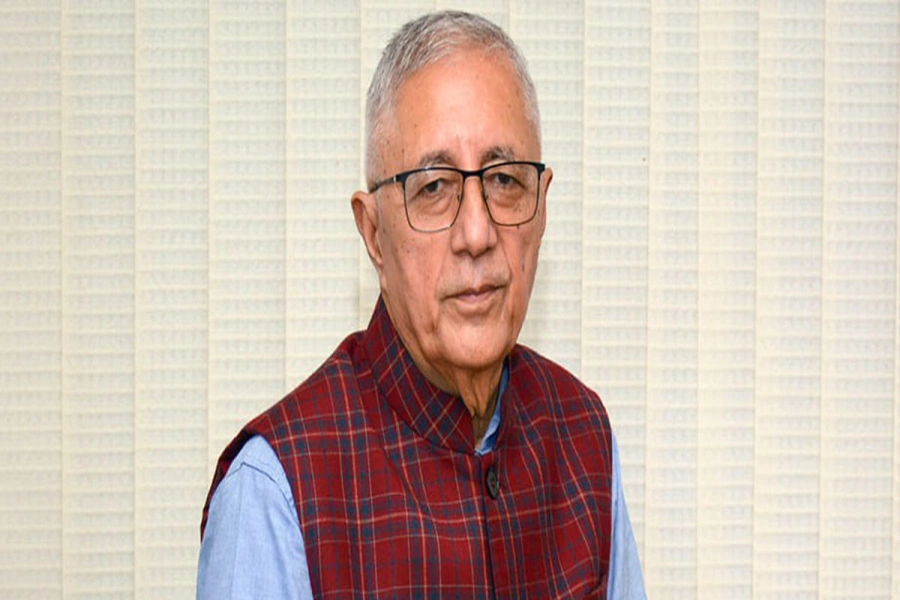Even though it’s been 25 years that she has studied Botany and, in particular, researched pollen and honey analysis, Mahalaxmi Shrestha still appears to be in awe of nature’s hardest workers, the bees. As it is, Nepal’s biodiversity and rich floral sources have helped produce a wide variety of honey.
However, despite the fact honey has prominently featured in our Nepali tradition, she and her colleagues believe that we haven’t even begun to explore their potential. Shrestha’s interest led her to open The Beekeeping Shop & Research Center in Manbhawan, Jawalakhel.
The Week met up with her at her store to become acquainted with honey and their uses.
How would you advise people to choose honey?
I always ask them to taste it. That’s the best way but I feel Nepali consumers are largely limited to that one time of ‘supermarket honey.’ It’s a shame because our country’s rich floral sources have allowed the bees to produce honey that are different in colors, taste, and properties. I’d say explore more of your options.
Many people are interested in honey’s medicinal properties. Could you explain how that works?
I will try and break it down in simple terms. You have to understand that honey is basically a composition of sugar and water. They are the product of nectar that is produced in plants. But I hope some have noticed that nectar is actually very watery and runny. So how does is it transform into honey? The answer is that the bees put in a lot of hard work and effort into it. Through various processes, a bee reduces the water content found in nectar. By the time they have reduced its moisture honey is a different product. Also they sort of seal it with wax.
Fresh & local

So yes while honey is water and sugar, by the end, they are also a completely different product that contains about 69% glucose and fructose, antioxidants and, mostly importantly, enzymes that have been produced from a bee’s body and mixed in the honey. This gives it protein as well as antiseptic properties. For all these reasons, people consider honey to be a natural medicine.
How do we know about different honey and their specific properties as well as uses?
In the context of Nepal’s honey, this is indeed still unclear. We know about the basic parameters of our honey that means we have researched their composition. There have quality tests as well. Our honey more than pass that test but we haven’t gone into in depth studies. We could study about the micronutrients and their impact on our health, but that hasn’t been done yet. We talk about the benefits of our honey based on international studies alone.
But if people wanted to make the most of their honey, how would you recommend they consume it?
People already use honey with lemon water but the benefits of honey isn’t only limited to weight loss. Some of these combos have been researched whereas some have been passed down for generations.
For example, Ayurvedic treatments and scientists have been researching the benefits of honey for a long time in relation to their healing abilities. That’s where their antiseptic properties come in.
Further, there is the positive effect it tends to have on cough and cold. I’d recommend taking one spoon of honey and half a spoon of freshly squeezed ginger juice. In case of cough, the results are often immediate.
A spoon of honey and another spoon of cinnamon mixed with mild hot water in the morning is believed to help with cholesterol as well. Similarly, you can also use some turmeric and honey to boost your immunity. Those with sleep troubles are also advised to take a spoon of honey with milk before bed.
All kinds of honey are said to have the general antioxidant and enzymes so you don’t need to be too particular about the type of honey. You can use any that is available to you at the moment.
Are some of your honey more popular than others?
Everybody tends to have preferences. Mustard honey is very common. It has been used in many communities for years and these days it has become more commercial in the Tarai belt due to better road accessibility. Farmers are harvesting more honey from there so mustard honey is pretty common.
If somebody is looking for something unique though, I always recommend Churie honey. The plant is only found in Nepal so they are automatically singular in taste and properties. Likewise, Litchi has its own niche. Many are fond of how extra sweet it is but you can’t produce a lot of litchi honey at a time so they are not that common in the market.
Buckwheat has become very popular of late as well. It’s one of those black honey and several international literature have established that they have higher mineral contents like amino acid making it really beneficial for your health.
Lastly, are there any common myths that you hear about honey?
People tend to think crystalized honey is fake. They think it has sugar but that’s not true. Crystallization is a natural process for any honey. We even sell crystallized honey. There are people who prefer them because they are easier to use.
Also while it is true honey doesn’t expire easily (researchers have found 1000 years old honey that was deemed to be in a consumable state), it is best to make sure they are kept in airtight containers and away from high temperatures. These can deteriorate the quality of the honey.
In fact, you should never cook honey. This robs it from its health benefits. Putting honey in hot water is one thing but if you boil or cook it in any way, it will deteriorate the enzymes.









_20191222200001.jpg)


























